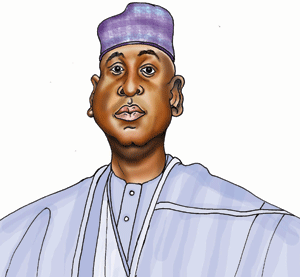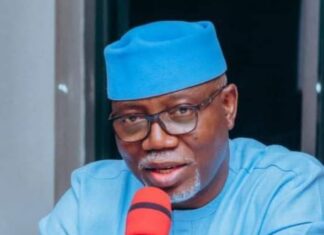Notwithstanding the political and legal intrigues that assail Senate President Bukola Saraki, the man exhibits inimitable leadership traits that seem to have wowed fellow parliamentarians, writes SAM NWOKORO.
 The legendary Italian political tactician, Niccolo Machiavelli, perfected the art of getting power and staying in power, even in the midst of political storms. The father of the-end-justifies-the-means, he was not advancing lawlessness; neither was he trying to advance the logic that once one is in a privileged position, one should maximise it to the point of bestiality. Machiavelli was simply putting into practice ordinary human inclination: survival when pushed to the wall, but in a civilised manner.
The legendary Italian political tactician, Niccolo Machiavelli, perfected the art of getting power and staying in power, even in the midst of political storms. The father of the-end-justifies-the-means, he was not advancing lawlessness; neither was he trying to advance the logic that once one is in a privileged position, one should maximise it to the point of bestiality. Machiavelli was simply putting into practice ordinary human inclination: survival when pushed to the wall, but in a civilised manner.
By the time the issues challenging the integrity profile of the Senate president are resolved through the legal processes they have been subjected, Nigeria would have either shaped up in true practice of party democracy or shipped out. Anyhow the pendulum swings, for subjecting himself to the rudiments of probity and rule of law, Nigeria’s Senate president has, for a start, set a worthy tone in leadership etiquette: subject yourself to popular views, for in the first place, it is the people that put you there.
But for as long as this tar on his otherwise noble antecedents lingers, Nigerians would not be judged wise to rush into hysteria against him, at least until the whole matter from the Code of Conduct Tribunal (CCT) to the courts are resolved. As one concerned observer commented over the matter: “Saraki’s case is not the first of such and may not be the last. We have had worse persons there before Saraki. So let us not crucify him yet.”
In the beginning
The genesis of Bukola Saraki’s current ordeal cannot be disentangled from the intrigues and manipulations of his party, the All Progressives Congress (APC) which is holding sway at the centre.
APC emerged majorly from a gallimaufry of disparate characters clustered in the Action Congress of Nigeria (ACN), Congress for Progressive Change (CPC), All Nigeria Peoples Party (ANPP), and a faction of the All Progressives Grand Alliance (APGA).
In the ordinary Nigerian characterisation, the APC was predominantly a party that belonged to the North and South West of Nigeria, a people seemingly bound by one spirit of brotherhood, by one common aspiration to continually manipulate the minority’s stakes in the power distribution system of Nigeria. Bukola Saraki comes from North Central zone of the country, the heart-beat of the minority nations.
With a population half Muslims, half Christians, and with so many dialects, North Central (Kwara where Saraki comes from inclusive) has always remained a hotspot in the power balancing equation of Nigeria’s federalism. It has always been a place every political party shops to balance the equation between North and South. And in the current political dispensation, since APC needed a top political office holder to balance power between North and South, so as not to appear overwhelmingly Northern or Southern, Saraki timed this earlier and defected from the Peoples Democratic Party (PDP) co-founded by his late father, Olusola Saraki (popularly known as Oloye) in 1998. It was mainly on account of Bukola’s verifiable accomplishment while he was a PDP governor in Kwara between 2003 and 2011 that enabled APC to win much states in the North Central in the last general elections.
However, Saraki knew that the new party he has berthed in are full of foxes who may have just liked his presence in the party not just for his leadership values, but for his political values. Thus many may not be surprised on why his APC National Executive Committee (NEC) members are not so much pulling their weight in the integrity crisis the man has just been subjected to in CCT. But why?
Soon after the general election, APC led by President Muhammadu Buhari, who had made so much noise about his eagerness to work only with ‘saints’, wanted a power configuration at the three main arms of government that would reflect adequate representation of all the states, ethnic pillars and zones in the country. Hence it was expedient for the main Northern political heavyweights in the party to support the Senate presidential aspiration of Saraki. That decision was not from the heart, but from the head, after all, Saraki is still a PDP man Friday in APC. So all that was needed was to wait for the right time, the period of main legislative works, such as the recent ministerial screening to tell him (Saraki) that he was not among the APC gods.
A political activist, Luke Nwana, says about the political ordeal of Saraki: “It is a witch-hunt. He is not core North. He is not in the traditional circle of Buhari’s men. That is why the party appears lukewarm in assisting him. Are you saying he is the only public officer there having integrity problem. It is the same thing they are doing on Amaechi. Did he not work for him (Buhari)? Is Amaechi the only dirty politician among the ministerial nominees? What was the result of the Department of State Security (DSS) investigations of the ministerial nominees? So let’s forget it. The man has been used. The next thing now is to dump him because they have already suspected that he is still PDP. They fear that if he tries to maintain independence of the National Assembly (NASS), he could easily defect to PDP if the APC-led presidency tries to frustrate him. So the strategy is to stop him now before he settles down to work.”
Firm but unobtrusive
The Senate president has in these trying times proved that notwithstanding the gale against him, he need not panic. Leadership is not about lamentation; it is about facing tasks squarely in whatever shape they come. No doubt, this much Senator Saraki had demonstrated since his unholy alliance with APC. Few days into the life of the administration, Saraki upstaged the ‘mainstream’ APC senators who wanted to thwart his Senate presidential aspiration in June during the election of NASS principal officers. A cacophonic tactic of South West senators’ clandestine meeting boomeranged and the old stock PDP cross-overs voted overwhelmingly for him and his deputy, Ike Ekweremadu. Since then, the spirits of ‘mainstream APC’ seemed to have vowed not to forgive him. However, the good thing about the man is that he has not allowed the distraction stymie his focus on the job.
Senator Saraki comes along as a youthful, zestful parliamentarian who seems to want to play the real change agent for the APC. Perhaps, he did not take into adequate consideration that his comrades in the South West might go this far in seeing that he is messed up for “robbing” them of their political ‘inheritance’. Even at that, discerning Nigerians are wont to indulge in the pacifist sentiment that a government overly dominated by core Northern oligarchic breed and South West ultra conservatives is a double-edged sword for Nigeria at this period of her evolutionary process in the theatre of plural democracy. Hence the sympathy for the Senate president.
Noble traits
Notwithstanding Saraki’s current travails, the ruling party may be on its way to unbundle itself into its former disparate camps, if it presses on without some caution. To many people, it is possible Saraki may not have committed hara-kiri as being portrayed by the press, even before final judgement has yet to be passed.
Presumption of innocence – sometimes referred to by the Latin expression, Ei incumbit probatio qui dicit, non qui negat (the burden of proof is on the one who declares, not on one who denies) – is the principle that one is considered innocent unless proven guilty. In many nations, including Nigeria, presumption of innocence is a legal right of the accused in a criminal trial, and it is also regarded as an international human right under the United Nation’s Universal Declaration of Human Rights (UDHR), Article 11.
But has the court found the man guilty? Well some would prefer he steps down and clear himself first. Yet some other Nigerians ask: Is he the first one to stay in office while trial is going on? What about sitting governors who are contending with litigations regarding the validity of their victory in the last election or even over cases of corruption?
Some good notes
Saraki served as governor of Kwara between 2003 and 2011. While there, he did some good projects that Kwara people cannot forget in a hurry. He taught other states that cargo airport is indispensable in Nigeria’s near-future transport matrix. He brought much of his American intelligence into policy works, elevating agriculture and sold to the Goodluck Jonathan government the consciousness to put more emphasis on agriculture to balance crude oil receipts.
Under Saraki, Kwara completed Nigeria’s first independent power project in collaboration with the defunct Power Holding Company of Nigeria (PHCN). He re-energised the Ganmo Power Station in Ilorin, the state capital, and connected over 375 rural communities to the national grid. With that, the state, since it was created, enjoyed about 20 hours uninterrupted electricity daily for much part of 2004 through 2011: reason the APC swept the state and most part of North Central in the last election.
Abubakar Bukola Saraki was born on December 19, 1962 to the family of Olusola Saraki, a senator between 1979 and 1983 and onetime Senate Leader. His mother is Florence Morenike Saraki.
He attended King’s College, Lagos, from 1973 to 1978, and Cheltenham College, Cheltenham, London from 1979 to 1981 for his High School Certificate. He then studied at the London Hospital Medical College of the University of London from 1982 to 1987, when he obtained his M.B.B.S (London).
He worked as a Medical Officer at Rush Green Hospital, Essex, from 1988 to 1989, and was a Director of Societe Generale Bank of Nigeria (SGBN) from 1990 to 2000.
In 2000, then President Olusegun Obasanjo appointed him as Special Assistant to the President on Budget. During this time, Saraki initiated the Fiscal Responsibility Bill. Saraki also served on the Economic Policy Coordination Committee, where he was responsible for the formulation and implementation of several key economic policies for Nigeria.
In 2003, he ran for the office of the Governor of Kwara State on the platform of the Peoples Democratic Party (PDP) and won. He was sworn into office in May 2003. He ran again for re-election in 2007 and won his second term. As governor of Kwara, he led reforms in agriculture, health, education, finance and environment policy. One of his major achievements was inviting displaced white farmers from Zimbabwe to Kwara and offering them an opportunity to farm. This led to the establishment of Shonga Farms programme, which is now being replicated across Nigeria. His charisma among his fellow governors got him appointed as Chairman of the Nigerian Governors’ Forum (NGF).
In 2012, Dr Saraki was appointed onto the Leadership Council of the Global Alliance for Clean Cookstoves, an initiative led by the United Nations Foundation that supports the use of public-private partnerships (PPPs) to create a market for clean cookstoves and fuels.
In 2013, Dr Saraki established GLOBE Nigeria as an affiliate of the Global Legislators Organisation, establishing a platform for legislators to advance environmental and sustainable development laws in Nigeria. He currently serves as GLOBE Nigeria’s President.
Dr. Saraki has also spoken and campaigned internationally on issues such as better governance, deforestation and economic development.
He is married to Toyin (nee Ojora) and they have four children together.













